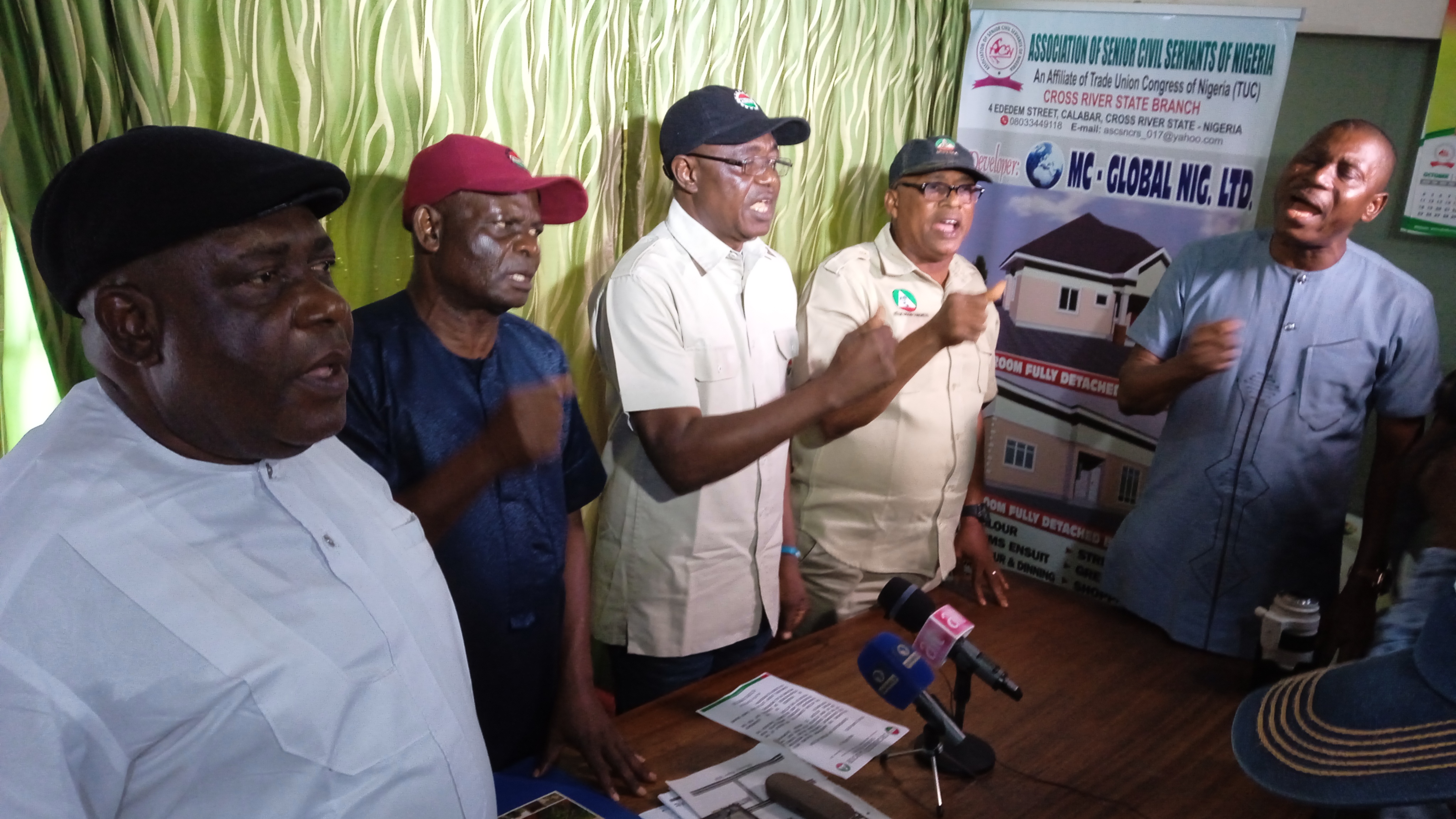By CrossRiverWatch Admin
The organized labor in Cross River State on Thursday, last week, suspended it’s 30 day industrial action after a deal was brokered by the Chairman of the Cross River State Traditional Ruler’s Council, Etinyin Etim Edet Okon. This is contained in its Bulletin 17.
All arms of the Unions in the State had embarked on an indefinite strike on October 12, 2021 with a list of 14 demands.
Negotiations had stalled several times with the executive and later legislative branch of government, and then stepped in the monarch, who is the Paramount Ruler of Bakassi.
And, following numerous rounds of negotiations, all parties reached some compromises which will see the State set aside a minimum of NGN50 million monthly for the payment of gratuities.
At the minimum rate agreed (NGN50 million per month), it will take 80 years to clear the current gratuities owed Local Government and State retirees since 1999.
The parties also agreed that the full implementation of the minimum wage will commence when the economy improves.
Annual incremental rates are supposed to commence by January 2022 while the payroll is to be returned to the office of the Accountant General and that of the Local Government split across different parastatals of government.
Read the full MoU below…
A MEMORANDUM OF UNDERSTANDING BETWEEN CROSS RIVER STATE GOVERNMENT AND ORGANIZED LABOUR (COMPRISING JOINT PUBLIC SERVICE NEGOTIATING COUNCIL (UNION SIDE), NIGERIAN LABOUR Arising from the CONGRESS AND TRADE UNION CONGRESS)
Arising from the Industrial action declared by Organized Labour in the State with effect from Tuesday 12th October 2021, over lingering labour issues and the intervention of HRM. Etinyin Etim Okon Edet, Chairman, Cross River State Traditional Rulers Council, the Cross River State Government and the Organized Labour negotiated and arrived at the following RESOLUTIONS:
That the implementation of promotions which is ongoing in the State with effect from September 2021, will end on or before August 2022 in both State and Local Government.
That the State Government agreed to set aside a minimum of N50 million respectively monthly with effect from January 2022 for the payment of gratuities to both State and Local Government retirees with an additional allocation up to the maximum of that month’s and or year’s gratuity in any month and or year when the revenue inflows increase. Also a committee comprising both Government and Labour leaders to be set up for verification and payment.
All remittances are ongoing in both State and Local Government. Subsequent deductions to be made alongside monthly salaries.
That full implementation of minimum wage for workers would commence when the economy improves.
That the balance of 27.5% to teachers shall be implemented when the economy improves.
That the tax exemption and allowance for Teachers should be restored after the legitimate beneficiaries have been ascertained by April 2022.
That annual incremental steps of both State and Local Government workers shall be restored with effect from January 2022.
That the State Payroll is domesticated in Office of the Accountant-General, while the Local Government Payroll is decentralized and domesticated in SUBEB for teachers, PHCDA for health personnel, Ministry of Local Government Affairs for Staff of Councils and Local Government Pension Board for retirees. Actual salary payment is committed to the salary banks by Directors of Finance and Supplies of Councils.
That the names of the affected Local Government workers have been restored to the Payroll.
That Local Government pensioners wrongly removed from the Payroll had been restored.
That the lift of ban on collection of check-off dues by NURTW and return of motor parks was referred to the Special Adviser (Labour) and the Commissioner, Ministry of Transport, for resolution.
That the contract for supply of computers to workers should be terminated, and a committee set up to ascertain the outstanding liabilities.
That the Commissioner. Ministry of Health and Director-General, Primary Healthcare Development Agency, should make a memo to His Excellency, the Governor stating the financial implication on or before 31st March 2022 on payment of Hazard allowance and the balance of 30% CONHESS to medical and health workers.
That the newly employed and verified but unpayrolled staff shall be payrolled effective January 2022. That the Labour Leaders and workers would not be victimized as a result of their participation in the strike action.
Since You Are Here, Support Good JournalismCrossRiverWatch was founded on the ideals of deploying tech tools to report in an ethical manner, news, views and analysis with a narrative that ensures transparency in governance, a good society and an accountable democracy. Everyone appreciates good journalism but it costs a lot of money. Nonetheless, it cannot be sacrificed on the altar of news commercialization. Consider making a modest contribution to support CrossRiverWatch's journalism of credibility and integrity in order to ensure that all have continuous free access to our noble endeavor. CLICK HERE |
New Feature: Don't miss any of our news again.Get all our articles in your facebook chat box.Click the Facebook Messenger Icon below to subscribe now
Text Advert by CRWatch :Place Yours

Will You To Learn How To Make Millions Of Naira Making Special Creams From Your Kitchen?.Click Here
Expose Your Business And Make More Sales. Advertise On CrossRiverWatch.com Today



Leave feedback about this